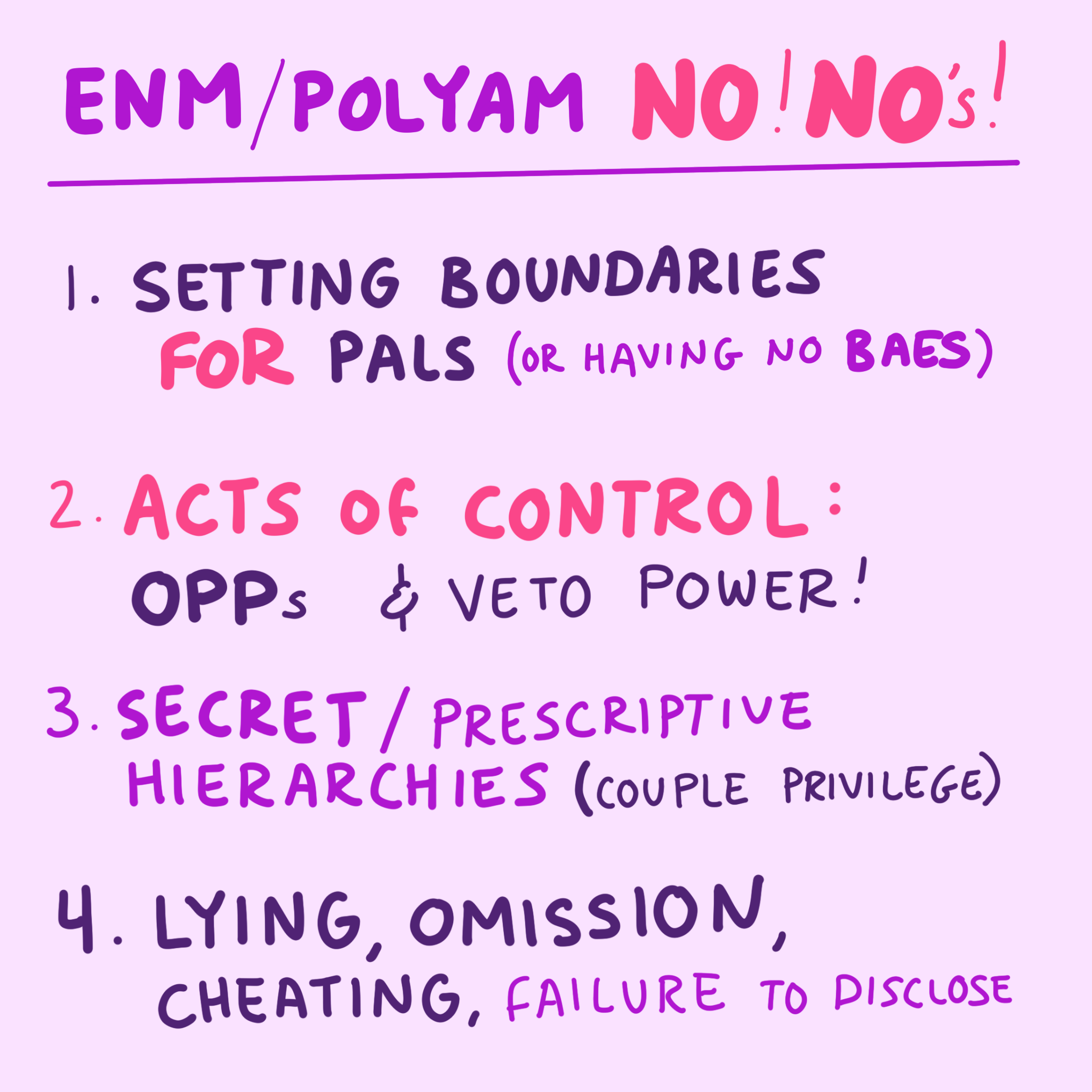Bad Practices In Polyamory
On Monday, I asked y'all what behaviors you believe are bad practices in polyamory and ethical non-monogamy. There are four themes that kept coming up:
1. Setting boundaries FOR pals (rather than for yourself)
I talk a lot about the importance of solid boundaries in non-monogamous relationships. When dating multiple people, there are competing needs and requests. Differentiating yourself from your pals allows you to understand your capacity for each relationship. Being a good pal means showing up authentically. Since we cannot control our pals, attempting to set boundaries for them is counterproductive. Boundaries should focus on you and what you can do. Check out our Mastering BAES WORKBOOK if you're unfamiliar.
Having no boundaries is not better. Folks say they want to be chill by not having boundaries. While I get the sentiment, being chill only works when you have a strong sense of self. Setting boundaries allows you to know what constitutes "chill" and what doesn't work for you. Boundary work is important to functional ENM. It's hard to date NM folks who have not done any of that work.
2. Acts of control (OPPs & veto power)
Trying to control your pal sucks. ENM can make folks insecure, and those fears can create impulses for not-so-great behavior. But restricting your pals won't make you feel secure in your relationship long-term. Security comes from within yourself and within your relationship, not outside. The only thing you can do is let go of your entitlement to control and restrict others and focus instead on creating stronger boundaries and agreements TOGETHER.
OPPs (One-Penis-Policies) refer to straight-assumed couples where cis-men tell their bi/pan woman partners that they can only date other women, not men or penis-owners, outside of the relationship. While many bi/pan women are only interested in dating other women, OPPs are frowned upon because they are imposed by male pals. In other words, OPPs restrict the ability of one partner to date folks... just because they have a penis. Again this is power OVER rather than the power within. Unfortunately, these policies are often accepted by people practicing ENM. It's important to recognize that OPPs are rooted in misogyny, the belief that women's sexualities are ultimately only for male pleasure; queerphobia, the belief that queer women are inherently less valid sexual pals and therefore not as threatening as other men; transphobia, treating trans women as "not real women." Even if a bi/pan girlfriend only wants to date women, that should be their choice, not a restriction from their male partner. Again, if OPPs are accepted in the relationship, it's likely that misogyny, queerphobia, and transphobia show up in other ways too. It's important to note that all genital policies are shady, however, OPPs are far more common and dismissed as not problematic, when they are.
Veto-power similarly gives a person outside of the relationship the ability to make final decisions for the people within. We often see veto power pop up in couples who were previously monogamous and wish to retain a certain level of exclusivity. Veto power allows someone within the primary couple to tell their partner to stop seeing their secondary or otherwise change the relationship. While having metas can be uncomfortable, part of being ENM means you need to recognize that your pal is the one who gets to make decisions about their other relationships. You cannot cancel your metas. It doesn't work that way. If you wish to retain full control over the relationship, monogamy is a great option for that!
3. Secret / Prescriptive Hierarchies
Within polyam communities, there's been a lot of buzz around non-hierarchical polyamory. Some people claim that NH-polyam is more ethical than H-polyam. Unfortunately, many many many people misinterpret what "non-hierarchical" means. To clarify: non-hierarchical polyamory means that there is no dominant couple that has the ability to assert decision-making power over other members of the polycule. Period. It does NOT mean that everyone is the same. It also doesn't mean that there's no order or boundaries. Time and resources are limited, so polyam folks have to be deliberate in the ways they share them whether you're H-polyam or NH-polyam. Each relationship requires different amounts of time and resources to make them thrive. Relationships that require less are not inherently less valid, nor are relationships with more resources better. Hierarchical polyam works for folks who have clearly established time and resource commitments in existing relationships. There's nothing wrong with explaining to new dates those existing commitments. In fact, descriptive hierarchies can help new dates understand where they fit into prospective polycules. NH-polyam by contrast works for folks who generally prefer to have flexibility in how they share time and resources. Neither structure is inherently better or worse, they just serve different purposes. Clarity is still a criteria for both as resource allocation shifts.
Now let's talk about secret or prescriptive hierarchies: aka when someone enters into a polycule and is not informed of the existing hierarchy or commitments. No one wants to be taken by surprise or feel used. Not disclosing resources and time allocation is a pretty shitty move because expectations cannot be set to respect the current circumstances. Being clear about your commitments and other existing relationships allows new pals to understand how they can fit in and decide if they want to or not.
4. Lying, Omission, Cheating, Failure to disclose
You don't need to call yourself polyam or ENM if that's how you want to operate.
I hope we got your juices flowing. As always, we aim to provide as much free and accessible content as possible; thanks to the amazing support of our patrons. Head over to our Patreon to support our work and get access to bonus content! If you have any questions or want to chat, please book a peer support session.

